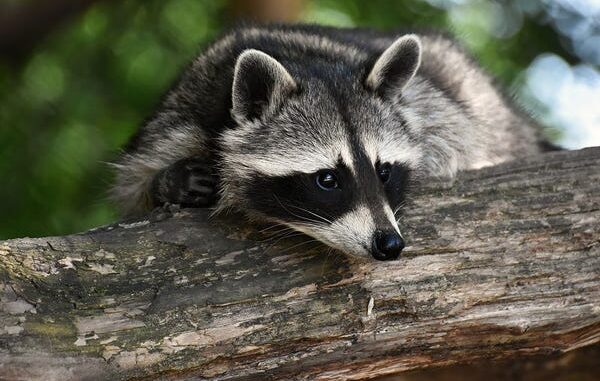
Raccoons are clever creatures, known for their varied diet of fruits, nuts, bugs, and small animals. But do they include snakes in their meals?
Raccoons are omnivores, with meat making up a significant part of their diet. While snakes are not their primary prey, raccoons do occasionally consume them, especially smaller species. However, the energy-intensive nature and potential danger of hunting larger snakes make them a less common choice for raccoons.
Table of Contents
Do Raccoons Eat Snakes?
Raccoons, known for their opportunistic omnivorous diet, may include snake eggs and smaller snakes in their food sources. Consuming snake meat provides raccoons with essential nutrients such as protein, vitamin B, zinc, and iron.
While they don’t actively seek out and attack and kill snakes, they won’t hesitate to take advantage of the opportunity if it presents itself. Their adaptable nature allows them to exploit various food resources, including insects, small mammals, birds, fruits, nuts, and vegetation, depending on availability.
When hunting snakes, raccoons may face challenges such as avoiding venomous species, territorial disputes with protective snake parents, and navigating hazardous environments. Despite these challenges, raccoons display ingenuity in overcoming obstacles, using their sharp claws and dexterous paws to access snake eggs or catch smaller snakes.
This adaptability showcases their resourcefulness in exploiting different food options to sustain themselves in diverse ecosystems.
How do raccoons kill snakes?
Raccoons, surprisingly intelligent creatures, employ unique hunting tactics, especially when faced with potentially venomous snakes. They have been observed using tools, such as rocks, to smash a snake’s head, rendering it unconscious before consumption. This strategic approach not only ensures a successful kill but also protects raccoons from the dangers of venomous bites.
Are raccoons resistant to snake venom?
Over the course of evolution, raccoons may have developed biological adaptations that render them less vulnerable to the impacts of snake venom. This resistance is probably a consequence of genetic variations that have been favored by natural selection, allowing raccoons to withstand encounters with venomous snakes. It is important to note, however, that while raccoons do exhibit some resistance to snake venom, they are not completely immune to its effects.
Snakes vs Racoons – Can Snakes Kill and eat raccoons?
Raccoons and snakes engage in a dynamic predator-prey relationship. Contrary to the notion that raccoons are always hunters, larger venomous snake species, such as copperheads or rattlesnakes, can actively hunt and kill raccoons.
Snakes are not completely helpless against raccoons, and instances of snakes reversing roles and preying on raccoons do exist.
However, snakes are generally not known for actively seeking out raccoons as prey, as their diets primarily consist of smaller animals like rodents and birds. The relationship between snakes and raccoons is typically one of avoidance, with each species occupying its own ecological niche.
Frequently Asked Questions (FAQs) About Raccoon and Snake Interactions
Q1: Do raccoons actively seek out and kill snakes?
A: No, raccoons don’t actively hunt snakes. Their opportunistic nature means they won’t go out of their way to find, attack, and kill a snake. However, if a raccoon feels threatened or encounters a snake, it may resort to defensive measures.
Q2: Are raccoons effective snake hunters?
A: Raccoons are more effective hunters of smaller prey like crayfish, snails, fish, or amphibians. While they can kill snakes, it’s not a top priority due to the energy required and potential dangers. They prefer easier meals and may consume snake meat if the opportunity arises.
Q3: Do raccoons actively keep snakes away?
No, raccoons do not actively keep snakes away. While they may encounter snakes in their environment, the relationship between raccoons and snakes is generally one of avoidance rather than intentional interaction.
Q4: Are raccoons afraid of snakes?
A: Raccoons may exhibit caution or avoidance when encountering snakes, especially if the snake is venomous. However, fear levels can vary, and raccoons often use their intelligence and agility to navigate potential threats from snakes.
Q5: How do raccoons protect themselves while killing snakes?
A: Raccoons showcase surprising intelligence by using tools to hunt snakes. They may take blunt objects like rocks to smash the snake’s head, rendering it unconscious. This method is both effective in killing the snake and protecting the raccoon from potential venomous bites.
Q6: Can snakes retaliate against raccoons?
A: Yes, larger venomous snake species like copperheads or rattlesnakes can actively hunt and kill raccoons. However, such instances are exceptions, and snakes generally avoid raccoons. They may only attack in self-defense, highlighting the complex dynamics between these species.
Conclusion
In the intricate dance of nature, raccoons and snakes engage in a dynamic predator-prey relationship. This nuanced interaction, characterized by occasional hunts and adaptability, showcases the delicate balance defining the coexistence of diverse species in the vast tapestry of nature.
